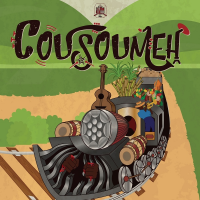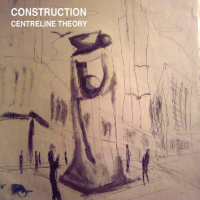Home » Jazz Articles » Extended Analysis » Akinola Sennon: Akinola Sennon: Cousoumeh
Akinola Sennon: Akinola Sennon: Cousoumeh
Ropeadope Records—an increasingly important record label in the U.S.—is home to steelpan jazz artists Leon Foster Thomas and Jonathan Scales Fourchestra—remarks openly that the record, "is an interpretation of jazz where the heritage of the island [Trinidad] and the full sense of the African diaspora collide, sometimes in a polished way and sometimes with a raw undercurrent." In recognizing that simultaneous pattern of up and down production value, one is effectively exposed to two sides of the musical adventure that Sennon has pursued in the making of this album.
On the one hand, Sennon along with percussionist Tambi Gwindi works with four young Boston-based musicians, drummer Shane Dahler, pianist Chris McCarthy, bassist Cole Davis and trumpeter Alonzo Demetrius Ryan Jr. on half the tunes on the eight-song album. Americans all, this aggregation approaches the idea of the Caribbean and Sennon's music with adroit solos and converses musically in a language that speaks to a proficiency of jazz improvisation while still searching for the Afro-Caribbean aesthetic.
On this group of songs, a stand-out track is "Doh Fight Meh" that features a spoken word promulgation by Persis Caesar that recounts the horror and tragedy of Black skin in the world—"melanin has just been declared illegal"—challenging listeners to disagree, but "doh fight meh!" That juxtaposition of vernacular spoken word and jazz music is reminiscent of Gil Scott-Heron's jazz poetry. The piece exposes a fissure between local voice and American music that—while not unassailable—points to the distance Caribbean vocal expression has to go before global consumption.
On the other hand, the four songs that exclusively feature the local ensemble find the "beat of the drum" and gel convincingly, and that it is reflected in the ease of performance and the response of Sennon as soloist. His bold gestures of confident playing—unencumbered by his apparent awe of the musical responses of the Boston-based American quartet—showcase a touch that is both dynamic and subtle. In these pieces we actually hear what the intention of the Cousoumeh project is all about: a fusion exercise that responds to the multiplicity of influences and focuses it in the steelpan. Both "Quinam Beach" and "Legacy House" in this song group support Sennon's new metaphysics, one that suggests, in his explanation, "that plural becomes singular, pieces become whole, the individual becomes the collective." What others may call syncretism, we understand from the music on this record as a New World fusion possible only in Trinidad and Tobago, that melting pot society of "languages and experiences; French and African, oppressor and oppressed, colonialism and independence."
In Trinidad, we have created indigenous philosophers. One is reminded of one of Sennon's mentors, local artist LeRoy Clarke's El Tucuche philosophy that articulates the supreme idea of man's metaphoric ascent to El Tucuche, the second highest mountain on the island—El Aripo, the highest mountain, is the Godhead—from the decrepitude of Douendom (backward thinking) to celebrate movement beyond the perceived negativity in the local society. Akinola Sennon, with this album has begun his definition of his own symbolic Cousoumeh philosophy: "Cousoumeh is a period of becoming." Alluding to the local cooking tradition of simmering the pot as the contents "boil down" and impart the myriad flavors to create the new, the pannist has begun a journey of supplanting the notion of the "tossed salad" with a "callaloo" (a blended Caribbean vegetable soup). Both men are suggesting an evolution, or a revolution in this case, in our sound and in our music.
Metaphors aside, this new album also adds to the growing catalog of jazz fusion records that local artists have been experimenting with for years and have been slowly moving towards the mainstream. The idea of calypso jazz has been part of the local music scene since the beginning of recorded music a century ago. Early local music recordings—made some five years before the first jazz record—revel in the improvised performance of instruments to give kalendas, paseos and calypsos a spirit of freedom associated with jazz; freedom from rigid music transcription, freedom to swing. The later codification of the calypso jazz as a definite fusion exercise in the 1960s in Trinidad created influences for musicians that endure still. Sennon comes almost full circle in redefining the "definition of calypso jazz" more so than redefining the genre. In 2016, a new generation of musicians is searching for new pathways to make a sound that we can call our own. Cousoumeh is on the right path.
Track Listing
Awe; People Make The World Go Round; Never Ever Worry; Quinam Beach; Legacy House; Doh Fight Meh!; You; A Way Of Life.
Personnel
Akinola Sennon
producerAkinola Sennon: steelpans; Tamba Gwindi: African drums, percussion; Shane Dähler: drums (1,2,3,6); Chris McCarthy: piano (1,2,3,6); Cole Davis: bass (1,2,3,6); Alonzo Demertius Ryan Jr.: trumpet (1,2,3,6); Mark Brewster: keyboards (4,5,7,8); Gideon Bishop: electric bass (4,5,7,8); Curtis Scope: drums (4,5,7,8); George Caesar: congas (4,5,8), background vocals, bass steelpan (5); Everald 'Redman' Watson: African drums (5); Dexter Ragnauth: tabla (4); Persis Caesar: spoken word (6,8); vocals (5); Students of the Deltones Institute of Steel Drums and Music: children's choir (3,8); Sheen Richardson: vocals (5) ; Jesse Cooper: vocals (5).
Album information
Title: Akinola Sennon: Cousoumeh | Year Released: 2016 | Record Label: Ropeadope
Tags
PREVIOUS / NEXT
Support All About Jazz
 All About Jazz has been a pillar of jazz since 1995, championing it as an art form and, more importantly, supporting the musicians who make it. Our enduring commitment has made "AAJ" one of the most culturally important websites of its kind, read by hundreds of thousands of fans, musicians and industry figures every month.
All About Jazz has been a pillar of jazz since 1995, championing it as an art form and, more importantly, supporting the musicians who make it. Our enduring commitment has made "AAJ" one of the most culturally important websites of its kind, read by hundreds of thousands of fans, musicians and industry figures every month.




















